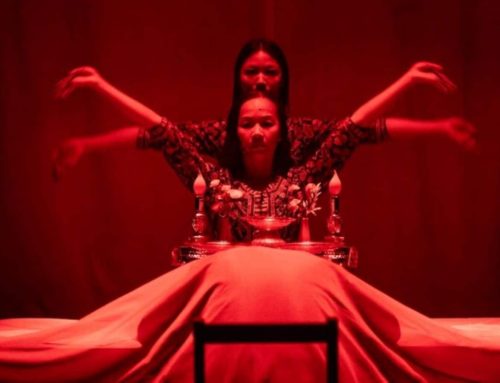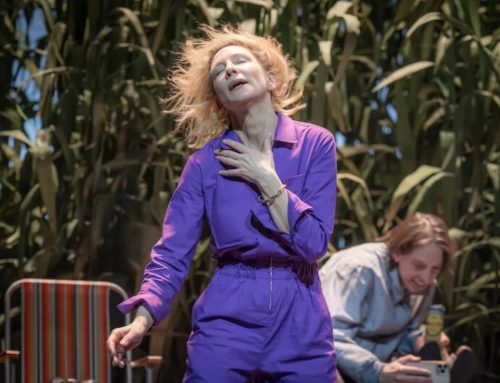Doug Wright’s dramedy bioplay Good Night, Oscar arrives from Broadway, burnishing rave reviews for Sean Hayes’s Tony Award-winning turn as the troubled mid-century musician, actor, and humourist, Oscar Levant. Hayes’s performance is indeed phenomenal. Actor and role exist here in a kind of artistic symbiosis that one rarely sees onstage. “It fit my fingers like nothing I ever played,” Levant says of Gershwin’s Rhapsody in Blue, but it could be Hayes reflecting on a role he does not so much perform as embody from the inside out. The rest of the piece, well-made as it is, feels somewhat more pedestrian.
Oscar Levant gained fame in New York as a talented pianist before moving to Hollywood, where he befriended George Gershwin (David Burnett’s ghostly turn mashes up the Emcee from Cabaret with a vampire), whom he came to envy and adore in equal measure. Later, he composed film music, made cameo turns in over a dozen films, and became a mainstay, taboo-breaking invitee on American radio and TV talk shows. Known for his acerbic, self-deprecating wit, he struggled openly with mental illness and addiction. Much of his later life was spent in and out of psychiatric hospitals under the care of his long-suffering wife, June (Rosalie Craig has just the right mix of wifely steel and empathy).
It is 1958, and Levant is slated to make his West Coast debut on The Tonight Show hosted by Jack Paar (Ben Rappaport, Machiavellian and manipulative). “This and the psych ward are the only two places I can get repeat bookings”, Levant tells us, though whether he will get a return invitation after tonight’s shenanigans is anyone’s guess. Levant is nowhere to be found, and studio boss Bob Sarnoff (Richard Katz channels corporate probity) is getting antsy, not just at the controversial guest’s absence but his sheer unpredictability on live TV.
What nobody is telling Sarnoff is that Oscar has been having electroshock treatment in a mental institution for the past month. His appearance depends on a four-hour furlough from the hospital, secured by June through some judicious lying to the doctors. Levant pitches up high as a kite on a cocktail of opioids, accompanied by medical orderly Alvin (David Adeosun impresses, though the character is mainly a foil for Levant’s ongoing verbal self-immolation) bearing an entire pharmacy of drugs in a neat black bag. “I turn into Emperor Nero without the charisma”, Levant threatens, should his 8 pm dose of Demerol be delayed. A ditzy Eric Sirakian completes the cast as Paar’s awestruck assistant, Max, whose attempts to keep the jerking, gurning Levant happy have predictably dire results.
The first exposition-heavy hour of the show boils down to various combinations of characters, including Levant and the ghost of Gershwin, anecdotally musing on how he became the formidably clever, tortured soul we see before us. There is a hint at childhood trauma (“mother wanted me to be a musician, I wanted to be an orphan”, Levant quips as he recalls being tied to the piano aged 7), which goes only so far. Wright proposes that Levant is haunted by the unattainable brilliance that Gershwin represents: a gold standard against which the addicted, insecure, mentally ill Oscar will never measure up. Think of a kind of Salieri to Gershwin’s Amadeus. It is solid bioplay meat-and-potatoes, and presumably, Wright knows his stuff, but one cannot help thinking there must be more to Oscar’s self-destructiveness than that.
Where Good Night, Oscar comes furiously alight is when we get to see a growling, slouching, chain-smoking Levant strut his stuff. Firstly, in the skilfully directed and deliriously funny live interview between Paar and Oscar (much of the dialogue here has been drawn verbatim from Levant’s writings and witticisms). Then we get an exquisitely painful seven-minute, dream-like sequence in which Hayes plays Gershwin live, complete with twitches, and demons flitting across his face. This is a tired, broken man struggling against himself, hallucinations, a grand piano, and the shadow of what might have been. He may not come out the other side. If the show finished here, you would feel you had your money’s worth, though Wright feels the need to roll the ghost of Gershwin once more to offer Levant some redemption.
Lisa Peterson’s direction crackles along at a rapid pace. Rachel Hauck delivers sets of ever-increasing size: small for Sarnoff’s office, larger for Levant’s booze-filled dressing room, and then the entire cavernous stage of the Barbican, cushioned in the foam of a padded cell. “TV is just another madhouse”, says Levant, and this play sets out to prove it. Ultimately, Good Night, Oscar is a solid piece of non-nonsense bioplay made brilliant by an unmissable Hayes.
Writer: Doug Wright
Director: Lisa Peterson
New – Online Shop!
My collected theatre reviews now available in paperback format for the years 2022 and 2023.
Just £10 per copy.
Over 100 reviews in each book.
- John Cutler’s Collected Theatre Reviews – Volume One. 2022. Paperback. 296 pages. ISBN 9781805179757. £10
-
John Cutler’s Collected Theatre Reviews – Volume Two. 2023. Paperback. 284 pages. ISBN 9781836884170. £10
Visit my Online Shop or click on Buy Now to order your copies.
More Recent Reviews
The Sea Horse. Golden Goose Theatre.
The Sea Horse, Edward J Moore’s grim slice of mid-century realism, debuted to solid reviews off-Broadway in 1974. Since [...]
Garry Starr: Classic Penguins. Arts Theatre.
Emperor penguins’ shortish treks between sea and nesting sites are about as peripatetic as your average Thameslink commuter. Garry [...]
When the Clarion Came to Call. Cockpit Theatre.
When, upon entering an auditorium, you are told, ‘Take as many pictures as you like, but mind the ceramics,’ [...]






